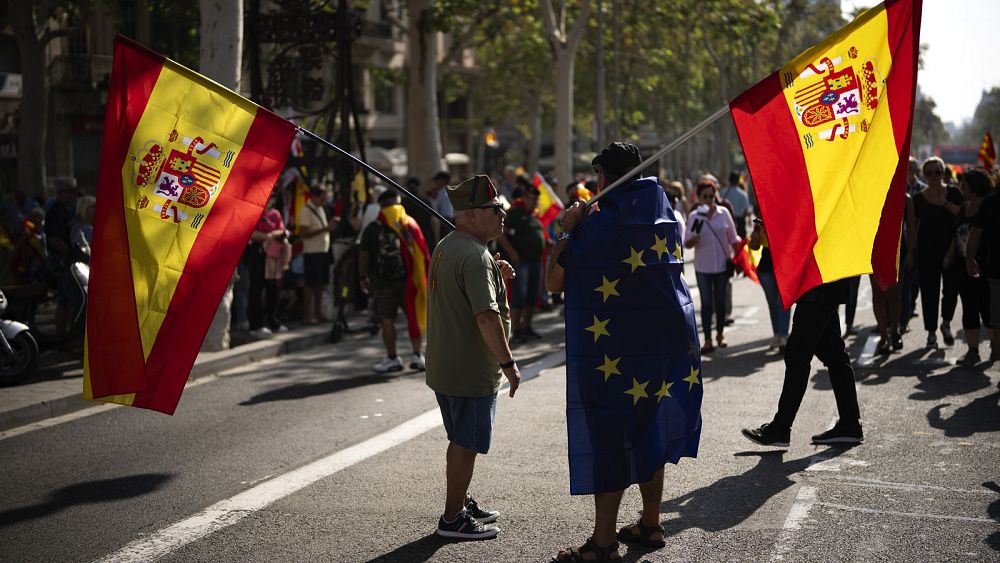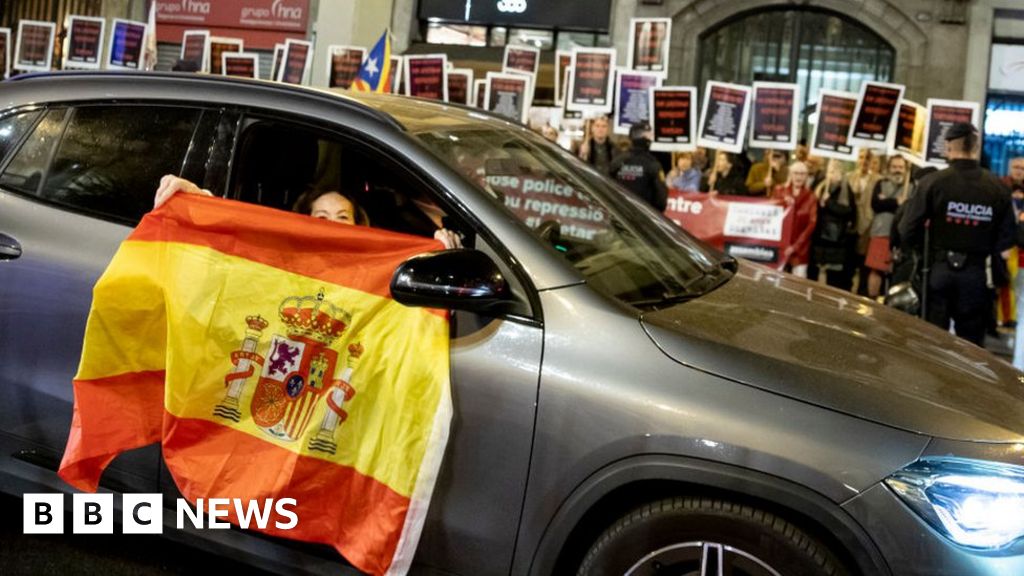Tens of thousands of citizens take to the streets to oppose the government’s proposed amnesty deal for Catalan separatists. The controversial agreement, aimed at securing the support of pro-independence parties for the Prime Minister Pedro Sánchez‘s bid for a new term.

Also Read: Thousands March Against AntiSemitism in France
The proposed amnesty law, if enacted, would extend clemency to hundreds of individuals involved in the illegal secession attempt, including high-profile figures like Carles Puigdemont, who fled to Brussels to evade prosecution.
Sánchez, the leader of the Spanish Socialist Workers’ Party (PSOE), defends the amnesty deal as a means to foster national coexistence after the events of 2017.
However, his political adversaries, particularly the conservative People’s Party (PP) led by Alberto Núñez Feijoo, condemn the move as a cynical ploy to retain power.
The issue of amnesty deal surfaced following a general election in July. While the PP emerged as the leading party, forming a government proved elusive, even with support from the far-right Vox party and other smaller groups.
The PSOE, along with its left-wing Sumar alliance partners, sought the backing of two main Catalan pro-independence parties by offering them the controversial amnesty. This deal has positioned Sánchez to secure the votes for his reappointment as prime minister.
The announcement of the amnesty deal has triggered protests across Spain, in major cities such as Madrid, Barcelona, Seville, and Valencia.
Tens of thousands have taken to the streets, expressing their discontent with effigies of Sánchez as Pinocchio and chants demanding prison for the prime minister.
Also Read: 300,000 Join Pro-Palestinian March in London, 126 People Arrested
With the PP claiming 500,000 participants in the Madrid rally, while the government’s delegate to the region puts the figure at 80,000.
The visuals of the demonstrations, by Spanish flags and banners, convey a sense of urgency among citizens who fear a compromise of democracy.
Alberto Núñez Feijoo, leader of the PP, accused Sánchez of “buying his investiture in return for giving his partners judicial impunity.”
The rhetoric from the opposition suggests a deep-seated belief that the prime minister is compromising the principles of democracy for political gain.
Isabel Díaz Ayuso, the PP president of the Madrid region, went further, characterizing Sánchez’s actions as revealing a “totalitarian” project, claiming he is willing to suppress institutions and state powers to maintain his grip on power.
Santiago Abascal, leader of the far-right Vox party, describing the deal as a “coup d’état in capital letters” and calling for a peaceful mobilization beyond the initial protests.
These strong statements underscore the situation, with politicians on both sides portraying it as a moment in Spanish politics.
Also Read: Sudan: More than 25 Million People Need Humanitarian Help
Sánchez urged the PP to show “good sense” and cease attempting to tensions. He defended the amnesty as a step toward social progress and coexistence, addressing the need to respect the results of the democratic process.
Sánchez painted the PP’s stance as aligning with the far-right, urging them to reject the “bear-hug of the far right” and abandon path.
The proposed amnesty aims to wipe away legal cases against those involved in the 2017 secession bid and protests.
Sánchez argues that this act of clemency will calm tensions within Catalonia, a more stable political environment.
The amnesty covers a period from the start of the push for independence in 2012 to 2023, concerns about interference in the judiciary.
Especially considering Puigdemont’s status as a controversial figure and the politically toxic nature of the Catalan independence issue.
The opposition views the amnesty as a political necessity for Sánchez to secure the backing of pro-independence parties and maintain a grip on power.
The demonstrations organized by the PP and Vox have seen outbreaks of violence, concerns about the potential for further escalation.
Stones, bottles, and fireworks thrown at police during recent rallies indicate a level of frustration and anger that is beyond dissent.
Also Read: Saudi Arabia Hosts Emergency Summits to Address Gaza Crisis




/cloudfront-us-east-2.images.arcpublishing.com/reuters/IA52QX3MTRNNBE7PD2DDDV2GUY.jpg)


















